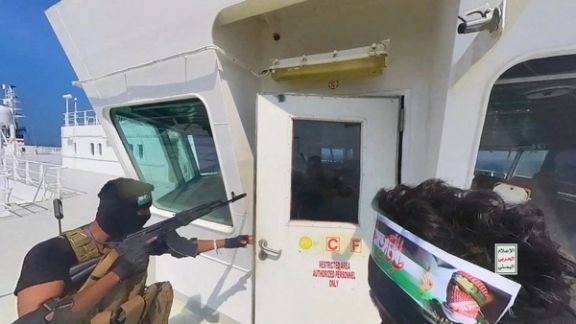Iranian MP Warns Of National Nutrition Crisis
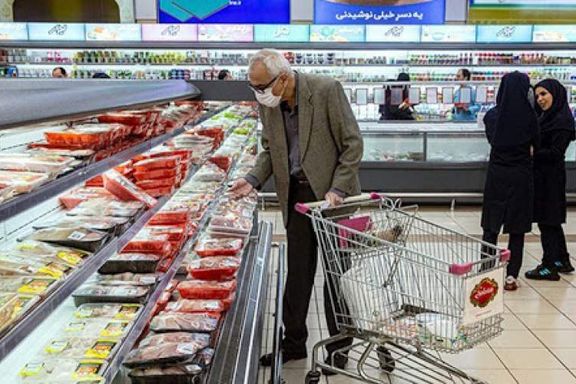
An Iranian MP expressed deep concern over the impact of soaring inflation on the nutritional well-being of the nation, particularly affecting children and pregnant women.

An Iranian MP expressed deep concern over the impact of soaring inflation on the nutritional well-being of the nation, particularly affecting children and pregnant women.
“Inflation, especially in the context of rising prices, is hindering the youth and prospective mothers from providing proper nutrition, posing a potential threat to the country's future. The nutritional crisis, marked by the absence of essential elements like proteins, meat, and carbohydrates, puts the next generation at risk,” Asghar Salimi warned.
Highlighting the potential ramifications for the country's future, Salimi emphasized the need to guarantee minimum standards of living by understanding the essential nature of food items and their daily requirements.
Moreover, Salimi highlighted the challenges faced by the Iranian population in affording staple foods, particularly fish. With exceptionally high prices, the accessibility of fish has become a luxury, extending to red and white meat, which has vanished from many households. The representative expressed doubts about the ability of many people to afford meat for their families on a monthly basis.
Earlier this month, economic website EcoIran reported that the inflation rate in the country has surged to its highest level in the past 22 months, reaching 54.8% for the month of Mehr (ended October 22). However, the CBI rejected the figure, insisting that the inflation rate is approximately 45%, citing discrepancies in calculations.
The economic turmoil is further exacerbated by a 12-fold depreciation of the currency since 2018, following the US withdrawal from the JCPOA nuclear accord and the imposition of sanctions. The Iranian rial has lost about 80% of its value compared to mid-2021 and nearly 50% since December 2021.
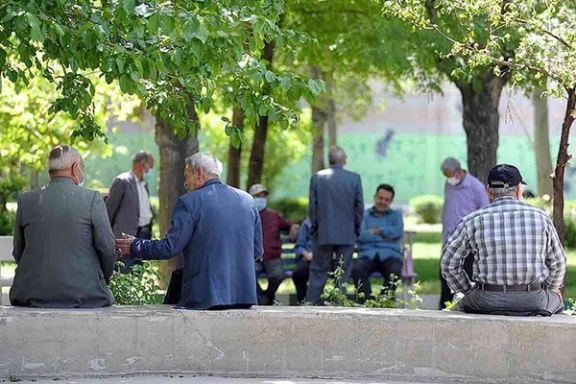
Iran's Islamic labor unions have urged the cancellation of a new law to increase the retirement age and required years of service to qualify for a full pension.
Iranian lawmakers on Sunday approved legislation that increases the retirement age for men by two years to 62, if they start working at age 20 and pay social security taxes for 42 years. Age of retirement for women has not been altered by the new law and remains 55.
In a statement Tuesday, the coordinating body of the Islamic Labor Councils called the new legislation, which is a part of the seventh development plan law, a severe blow to workers.
The Constitution of 1979 recognizes workers’ right to form unions, but the Islamic government has always been very intolerant of independent unions. In 1985 the parliament passed a law that endorsed Islamic labor councils as an alternative to unions which the government has always tried to bring under its control.
The new legislation has also increased the number of years in employment to qualify for a full pension.
Those who enter employment after the final approval of the new law will have to work for over 42 years to qualify for a full pension, while those currently working will have incremental increases to their required work years.
A person who enters the workforce at the age of 30 after the final of approval of this law, for instance, will have to work until the age of 72 years to benefit from a full pension.
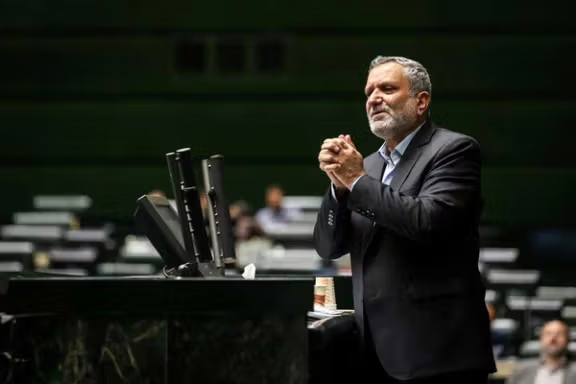
Amid economic hardship and a 50-percent annual inflation rate, it is not just the unions who object to the law, but also the public in general, who see the government move as yet another tactic to force ordinary Iranians to pay for its inefficiency and corruption.
The legislation, which like other laws approved by the parliament has yet to be reviewed and approved by the constitutional Guardian Council, has been very strongly criticized by many including some of the lawmakers.
On Tuesday, Minister of Labor Solat Mortazavi acknowledged that the decision to increase the retirement age and qualification for full pension is primarily aimed at addressing the financial challenges faced by retirement funds. The looming insolvency of many of these funds poses a significant challenge to the government. Mortazavi emphasized that such measures are essential to stabilize the funds, preventing their complete insolvency in the near future.
Iran's Civil Servants Pension Fund (CSPF) is the largest fund in the country after the Social Security Organization with over 1.7 million members.
Critics blame mismanagement and corruption for the several-year-long crisis in pension funds.
In April 2022, for instance, Hossein Amerian, the newly appointed director of the governmental steel industry pension fund, said the fund had incurred a loss of around $400m through mismanagement and embezzlement of former officials of the fund.
The Steel Industry Pension Fund pays the pensions of tens of thousands of workers of government-owned and privatized steel companies.
The Social Security Organization, a non-governmental organization that provides health insurance, pension, and unemployment benefits to millions of members who work for the private sector or are self-employed, has similarly been in crisis for years. The organization covers more than 73 percent of the Iranian population.
Successive governments have driven the Social Security to insolvency by massive borrowings to make up for budget deficits, while Iran sits on one of the world’s largest oil and natural gas deposits.
The government is responsible for contributing of three percent of insurance premiums to the social security fund. However, in October, an official of the organization’s Pension Fund said the government currently owes $ 15 billion to the organization.

The United States has intercepted and shot down several one-way attack drones launched by Iran-backed Yemeni Houthis on Thursday morning.
The US Central Command (CENTCOM) announced in a post on X that the attack was repelled by the USS Thomas Hudner, an Arleigh Burke-class guided missile destroyer.
“The drones were shot down while the US warship was on patrol in the Red Sea,” added the report.
According to CENTCOM, “the ship and crew sustained no damage or injury.”
The attack came hours after the Israeli Defense Forces (IDF) shot down a cruise missile over the Red Sea before it could infiltrate into the Israeli territory.
The missile, which targeted Israel’s southernmost city of Eilat, was believed to have been launched by Yemen’s Houthis, The Times of Israel reported.
On November 15, the Hudner engaged another drone that originated from Yemen. The US Defense Department said in a statement regarding the attack that the drone “was heading in the direction of the ship.”
Since Hamas’s deadly onslaught on Israel on October 7, Yemen’s Houthis, backed by the Iranian regime, have launched several drone and missile attacks against US and Israeli targets in the region.
The Israeli military said on Sunday that Yemen's Houthis had seized a cargo ship in the southern Red Sea as it was sailing from Turkey to India.
The Israeli Prime Minister's Office issued a statement after the hijacking of the ship, calling it “an act of Iranian terrorism.”
Though the Islamic Republic has avoided any direct involvement in the Israel-Hamas conflict, the regime has used its proxy groups in the region such as Houthis and Hezbollah to attack Israel and American targets.
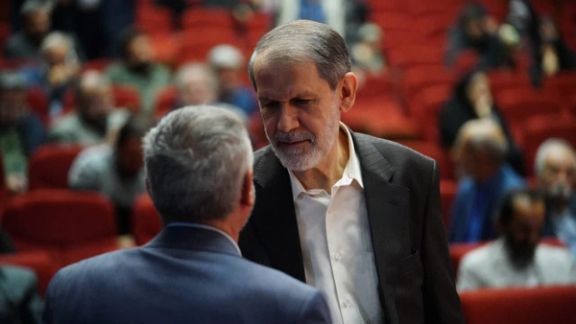
A cleric, once recognized as former populist President Mahmoud Ahmadinejad's exorcist, has raised questions about the income sources of a wealthy financier of hardliners.
In an interview with Khabar Online, Abbas Amirifar stated that Sadeq Mahsouli, the leader of the ultraconservative Paydari party that dominates the Iranian parliament, with several members serving as President Ebrahim Raisi's ministers, must disclose his income sources and the extent of his wealth to the public.
Earlier, conservative political commentator and a former editor of the Kayhan newspaper had also said that Mahsouli should be transparent about the source of his income and tell the nation how he became a super capitalist.
Mahsuli was an aide to Ahmadinejad in the 1990s when he was the governor of Ardabil province. Later, he became his interior minister when Ahmadinejad rose to power as Iran's President in the 2000s.
Mahsouli currently advocates for a political purification campaign launched by his peers, seeking to consolidate all political power within the ranks of the Paydari Party. The campaign has gone much further than just the government, with hundreds of university professors, teachers and artists fired or banned from working.
Hesameddin Ashna, an adviser to former President Hassan Rouhani, has wryly remarked that the present government in Iran is a result of "Mahsoulicracy."
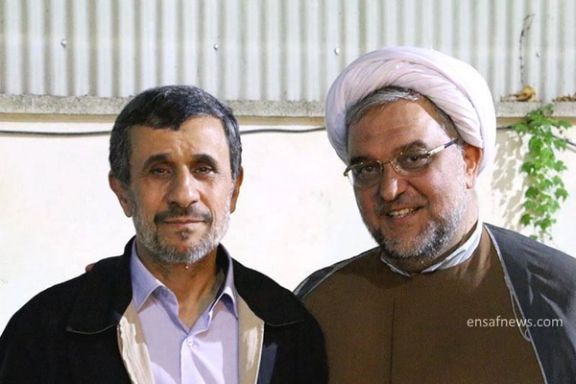
In an interview with Khabar Online, the cleric Amirifar said that the party would not have survived without financial support from Mahsouli's holdings. He added that Paydari was a legitimate political organization when its founding father Ayatollah Mesbah Yazdi was alive, but after his death the party lost its legitimacy. He opined that if Mesbah Yazdi was alive, he would have opposed Mahsouli's position in the party.
Amirifar argued that Mahsouli is not a popular political figure and if he ever becomes a candidate for any post, he is unlikely to win the people's vote. However, he insisted that individuals close to Mahsouli run rich entities including the Social Security Organization and the Ministry of Welfare.
While many believe that Mahsouli is a front for Morteza Aqa Tehrani who cannot be the party's leader because of his reputation as a cleric who has a US permanent residency or possibly citizenship, Amirifar said that Mahsouli hides behind Aqa Tehrani to conceal his vast financial resources.
Moreover, Mahsouli's inclusion in the Ahmadinejad Administration tarnished the former President's reputation, as Mahsouli's wealth and financial dealings contradicted Ahmadinejad's professed commitment to social justice. Amirifar noted that Ahmadinejad realized too late that Mahsouli's role in the government was counterproductive.
Mahsouli, a former IRGC general during the Iran-Iraq war of the 1980s, was Ahmadinejad's classmate at the university and his access to vast financial resources first became controversial when the parliament found it hard to endorse his qualifications as Interior Minister, although he finally won the vote of confidence with a narrow margin. He was named as one of the top 10 wealthiest people in Iran 15 years ago.
In his early career in the government, he was close to current aide of Supreme Leader Ali Khamenei, Parviz Fattah, and current Energy Minister Ali Akbar Mehrabian and several other ultraconservative politicians around Ahmadinejad.
When he wanted to become Ahmadinejad's Oil Minister in the 2000s, he was forced to withdraw his candidacy for the post as an investigation into his sources of income went badly controversial. He finally managed to become Ahmadinejad’s interior minister by just one vote in the parliament.
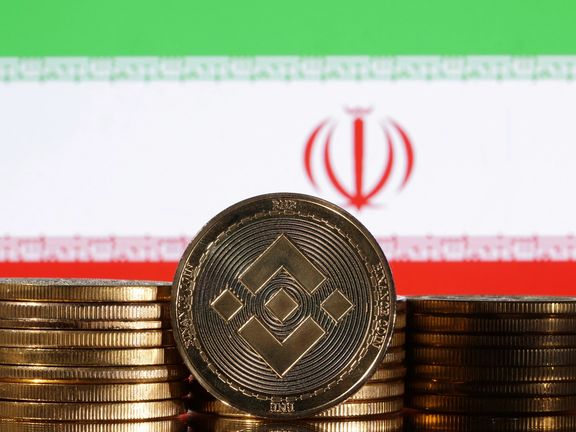
Binance, the world’s largest cryptocurrency exchange, has been implicated in allegations of violating Iran sanctions and terrorism funding by the US Treasury.
In a historic move described as “the new era in crypto crackdown,” the US Department of Justice, Treasury, and the Commodity Futures Trading Commission have imposed a record $4.4 billion fine on Binance on allegations that it enabled the laundering of substantial sums of illicit money worldwide.
US Treasury Secretary Janet Yellen said "Binance turned a blind eye to its legal obligations in the pursuit of profit. Its willful failures allowed money to flow to terrorists, cybercriminals, and child abusers through its platform."
Crypto wallets at Binance were found to interact with bitcoin wallets associated with groups designated as terrorist organizations by the US and several other countries, including the Islamic State and al-Qaeda as well as the armed wing of Iran-backed Hamas, and another Iran-funded militia the Palestine Islamic Jihad (PIJ), the US said.
The global trading platform, which accounts for about half of all crypto activity, is charged with facilitating money laundering, aiding terrorist networks like Hamas, and violating sanctions on countries such as Cuba, Iran, Russia, Syria, as well as playing a role in human and narcotics trafficking. The indictment accused Binance of conducting over $1 billion in transactions with sanctioned countries and criminal actors.
US Attorney General Merrick Garland said Binance enabled nearly $900 million in transactions between US and Iranian users, noting that it had a "significant customer base" from some sanctioned jurisdictions and was aware that Iran represented "the majority of such customers." From around January 2018 to May 2022, Binance processed 1.1 million crypto transactions worth at least $898.6 million between US customers and those who lived in Iran, he added.
Around 2019, Binance continued to serve "thousands of users" identified as being from sanctioned countries, the US said, including over 12,500 users who provided Iranian phone numbers.
In 2022, Reuters cited blockchain data as indicating that the crypto giant has processed Iranian transactions with a value of $8 billion since 2018 despite US sanctions intended to cut Iran off from the global financial system. Almost all the funds, some $7.8 billion, flowed between Binance and Iran's largest crypto exchange, Nobitex, according to a review of data from leading US blockchain researcher Chainalysis. Nobitex offers guidance on its website on how to skirt sanctions.
Three-quarters of the Iranian funds that passed through Binance were in a relatively low-profile cryptocurrency called Tron that gives users an option to conceal their identities. In a blog post in 2021, Nobitex openly instructed clients on how to use Tron -- a mid-tier token -- to trade anonymously without "endangering assets due to sanctions."
There is no easy way to differentiate between the crypto transactions done by people linked to the Islamic Republic and those by ordinary Iranians. Binance said July 2022 that it follows international sanctions rules on Iran and blocks access to the platform to anyone based there. However, almost all Iranian customers used VPNs to conceal their locations and continued trading on Binance.
Billionaire Binance chief Changpeng Zhao stepped down and pleaded guilty to breaking criminal US anti-money laundering laws as part of the settlement resolving a years-long probe into the crypto exchange, prosecutors said on Tuesday. Zhao faces a possible prison sentence of between 10 and 18 months, according to US sentencing guidelines.
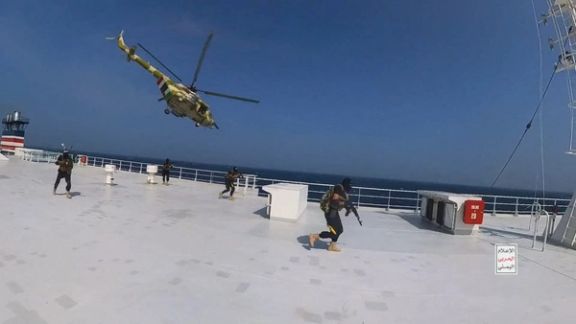
A Revolutionary Guards ship has allegedly helped the Iran-backed Houthis hijack a cargo vessel in the Red Sea, an operation reportedly led by an IRGC Quds Force commander.
The Galaxy Leader car carrier, owned by Israeli billionaire Abraham "Rami" Ungar but operated by the Japanese company NYK Line, was seized by Houthi forces Monday. Japan is said to be in direct talks with the group the US is now considering redesignating.
The hijacking, captured in footage released by the Houthis, depicted armed men storming the vessel from a helicopter.

An Iranian spy ship, the Behshad, associated with the Islamic Revolutionary Guard Corps (IRGC), is believed to have played a role in disclosing the Galaxy Leader's location to the Houthis. The Galaxy Leader had turned off its AIS transponder, raising questions about how the vessel's location was made known to the rebels. The Behshad, converted from a cargo vessel, has been present in the Red Sea since 2021, further deepening its connection to the IRGC.
Ronen Solomon, an independent intelligence analyst for IntelliTimes, says evidence points to IRGC Quds Force commander Brig Gen Abdolreza Shahlaei as the potential orchestrator of the hijacking.
The US government's Rewards for Justice program has a bounty of up to $15 million on Shahlaei's head, citing his involvement in attacks against Americans and US allies.
There are 25 hostages of various nationalities on the vessel being held in Yemen. Iran has a history of ship attacks since 2018, coinciding with the US's "maximum pressure" sanctions campaign.
It is believed the Houthis thought the vessel was Israeli, hoping to capture Israeli hostages, amidst the Gaza war. Iran-backed Hamas invaded Israel on October 7, resulting in relentless attacks from Israel. Regime leaders have condemned the Israeli assault and have activated Iran's proxies in the region, including the Houthis, which had threatened to hijack Israeli vessels in the region. The Houthis have also sent missiles towards Israel, along with proxies in Syria, Lebanon and Iraq.
